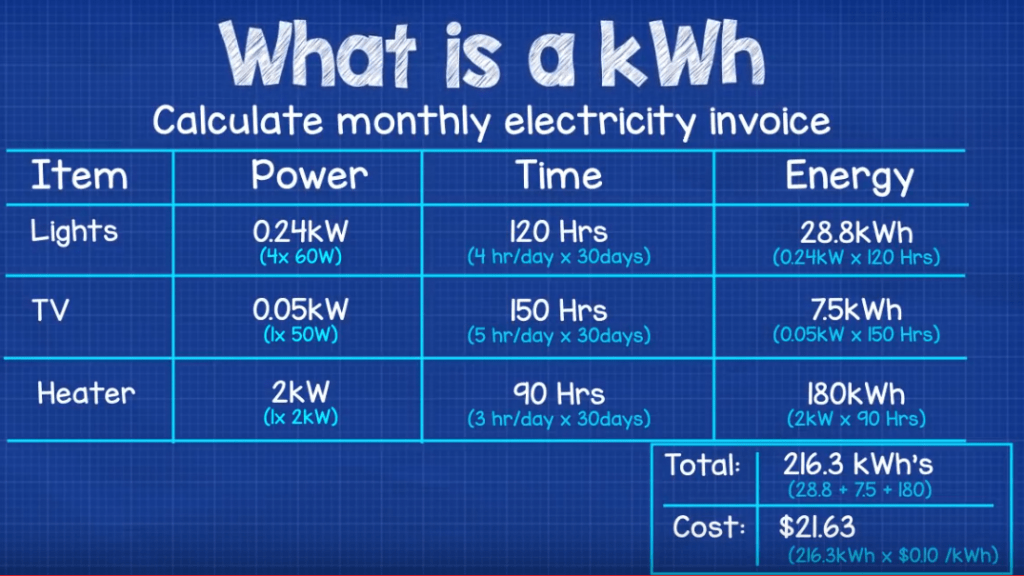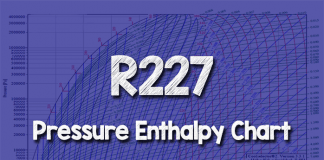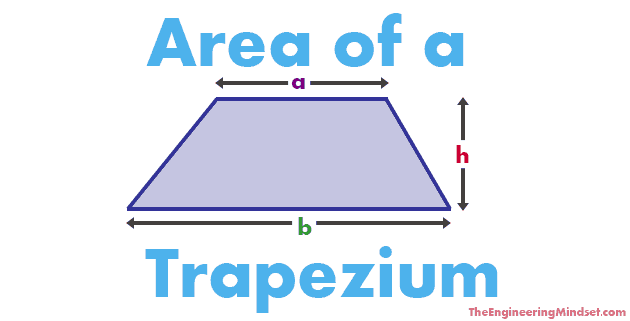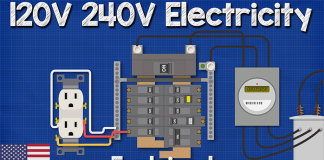kIlowatt Hours or kWh, what are they? In this article, we’re going to be looking at what a kilowatt hour is. We’re going to cover kilowatt hours, watts, kilowatts, and joules, converting between watts and kilowatts, also how to calculate your kilowatt hour usage with some worked examples towards the end, and lastly how to calculate your monthly electricity bill.
Scroll to the bottom to watch our YouTube tutorial video on this article
Now, you’ve probably noticed that your electricity bills will show you’ve been charged for an amount of kWh’s which we used, and when you buy electrical goods they are rated in W’s or kW’s. Your electricity bill is rated in kWh, which means kilowatt hour. This is how much power was demanded over an amount of time. Power multiplied by time equals energy. So let’s quickly look at what a kilowatt is, and then we’ll come back to kilowatt hours with some calculations, and this will make things a lot easier.
On the electrical goods you’ve purchased, you’ll see a value stated in W or kW, meaning watts or kilowatts. This is the power demanded of the item, it tells us how much energy per second this will demand in order to work.

You can see above that the air heater is rated at two kilowatts, and this light bulb is rated at 100 watts. Kilo means 1,000, and watt is a rate of power named after the engineer called James Watt. To be precise, a Watt means one Joule per second, and a kilowatt hour equals 3.6 megajoules.
What is a Joule? A Joule is an amount of energy transferred to do some work. Our food contains energy rated in Joules or Calories, and we consume this to heat and power our bodies. But in this case, a Joule in electrical terms is the amount of energy dissipate as heat when an electric current of one amp passes through a resistance of one ohm per one second.
By the way, we have a free YouTube tutorial on How Electricity Works which you can watch by clicking here. If you don’t understand the article so far, then I highly encourage you to watch that first.
Converting W <–> kW
You can convert kilowatts to watts simply by multiplying by 1,000. So one kilowatt multiplied by 1,000 is 1,000 watts.
That’s because there’s 1,000 Watts in a kilowatt.
Example: 6kW * 1,000W/kW = 6,800 Watts.
You can also convert watts to kilowatts simply by dividing by 1,000. So 100 watts divided by 1,000 is 0.1 kilowatts.
That’s because it takes 1,000 Watts to make a kilowatt.
Example: 6,800 Watts / 1000W/kW = 6.8kW
To work out how much electricity will be used by the air heater we saw earlier, we need to know how much power it will demand and how long it will be switched on for. We can see that this item is rated at two kilowatts.

If you don’t know the power rating of an item, you can buy one of these cheap plugin energy monitors which will tell you the volts, the amps, the watts, and also the kilowatt hours.
Calculating kWh’s
Back to the heater. We want to know how many kilowatt hours this will use. We know we can use the energy formula,
Formula: Energy = Power x Time
We also know that the power is rated at two kilowatts, and we decide that this heater will run for three hours. So two kilowatts multiplied by three hours equals six kilowatt hours.
Calculation: 2kW x 3 Hours = 6kWh
But what if the heater only runs for 30 seconds? We can still use the energy formula, but because we’re invoiced in kilowatt hours, we need to convert the seconds into hours. There are 60 minutes in an hour and 60 seconds per minute, so 60 multiplied by 60 gives us 3,600 seconds per hour. We can then convert the 30 seconds runtime into hours by dividing the 30 seconds by 3,600. That means we will run for 0.0083 hours.
Two kilowatts multiplied by 0.0083 hours equals 0.0167 kilowatt hours.
Example: 2kW x 0.0083 Hours = 0.0167 kWh
How about smaller items when they’re rated in watts? Let’s say we have a 60-watt light bulb and it’s switched on for 10 hours we still use the formula: Energy = Power x Time, but we need to convert the Watts into kilowatts, as we’re invoiced in kilowatt hours. So 60W divided by 1,000 is 0.06 kilowatts. And 0.06 kilowatts multiplied by the run time of 10 hours equals 0.6 kilowatt hours.
Calculating Energy Costs from kWh’s
If we want to calculate the cost, then we simply multiply the kilowatt hour consumption by the electricity tariff set by our electricity supplier per kilowatt hour. If we look at the heater fan, which is two kilowatts (2kW), and we run this for three hours, then two kilowatts multiplied by three hours equals six kilowatt hours. Our electricity company sells us electricity at 10 cents per kilowatt hour ($0.10), so six kilowatt hours multiplied by 0.1 dollars per kilowatt hour equals 60 cents.
Example: 2kW x 3 Hours x $0.10/kWh = $0.60
How about calculating our electricity consumption for the month? Well, we need to create a table for all the electrical items in the building. Then we note down their power. Remember to quantify how many of each item you have and ensure that each item is rated in kilowatts, you may need to convert them from Watts. Then we need to calculate how many hours per month they will be switched on for. From there, we can calculate the electricity consumption for each item using the energy equals power multiplied by time formula.

Once you’ve done this for all the items, just add up the values in the energy column, and this will give you a total kilowatt hour consumption per month. Once you know this, you can calculate the cost. Don’t forget, there will likely be other costs on the supplier’s invoice, things like tax, etc. So if you need this in there, then you can build these in separately to suit your needs.





















Sir how can measure chiller cooling by the area? Thanks
[…] capacity of your solar inverter will be indicated in kilowatts (kW). A 1kW inverter can handle 1,000 watts of DC power. If you’re unsure of how much power you […]